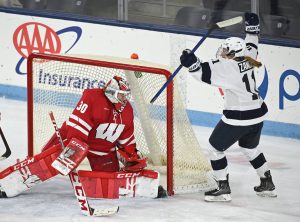Every coach has a different philosophy for how to fill out their non-conference schedule. In larger conferences, there are fewer slots that need to be filled. In a conference like the CHA, with only six teams, there are more. Add in that last season and this one, the CHA is playing with just five teams, and that leaves 20 or so possible non-conference games to schedule.
Penn State coach Jeff Kampersal likened scheduling to a complex jigsaw puzzle. And there are far more things that go into creating a non-conference schedule than picking an opponent. Most programs agree to a home and home series, where the teams play at each participant’s home venue, usually over the course of two seasons. Increasingly, as we see this weekend at St. Lawrence, teams that are traveling a long distance will schedule a round robin, where one team hosts and two teams travel to the site and they all play each other once. There are also various tournaments around the holidays and winter break.
Beyond logistics, Kampersal said he considers things like how non-conference opponents prepare his team for the season and also how a positive result for the Nittany Lions against a ranked team benefits his team’s chances for an at-large bid at the end of the season, especially now with the expanded field.
Kampersal pointed to what now retired coach Paul Flanagan accomplished at Syracuse and how successful Mike Sisti has been at Mercyhurst and the progression of those programs as reference points for what he’s trying to emulate.
“We’re trying to follow that model to play the best (teams) to elevate our program,” he said.
Playing games against prestigious universities is also an important component of recruiting, said Kampersal. He knows the CHA can have a reputation as a weaker conference and that it could make recruits want to go to school somewhere else. The only CHA team to win an NCAA tournament game is Mercyhurst. They are 5-17 and their last NCAA win was in 2014.
“I believe we have strong teams at our conference, but the perception is still kind of what it is, so we’re trying to change that perception,” said Kampersal.
Much like with recruits, the importance of these games on campus is as much about how people view them as anything. The Nittany Lions’ win over Wisconsin last week was a big step for the program, but it also provided a huge boost in the perception of the team on campus and around town. Wisconsin is a prestigious women’s hockey program with six  national championships – but maybe more importantly in State College, they’re a Big Ten rival. That win had name recognition beyond women’s hockey and that makes a difference when it comes to winning new fans at a sports-crazy university. And it had an immediate impact. There were 40% more fans at the second game in the series.
national championships – but maybe more importantly in State College, they’re a Big Ten rival. That win had name recognition beyond women’s hockey and that makes a difference when it comes to winning new fans at a sports-crazy university. And it had an immediate impact. There were 40% more fans at the second game in the series.
“That’s our goal, to get more and more fans and people involved in our sport,” said Kampersal.
Of course, none of this matters if Penn State doesn’t win these non-conference games. Last season his team went 0-3-1 in four games against St. Lawrence and Boston College to start the season. They rebounded by going 8-3-1 in games against Brown, Holy Cross, Minnesota Duluth, Ohio State, New Hampshire, St. Cloud State, Boston University and Cornell.
Kampersal said he’ll definitely evaluate the strategy if his team fails to win any more of their games against these opponents this season, but he doesn’t foresee that being the case. This is all part of the process of building his program to a point where they can be successful. That means having the depth to push top-ranked teams, something that wasn’t necessarily the case in the past.
The team learns from these games, even if they lose, and Kampersal said having played them makes his team stronger when it comes to the postseason. He again referenced Syracuse, who won the conference tournament championship – and NCAA autobid – despite placing third in the conference.They were ready for increased pace of play and more physical games because of the non-conference schedule they played, he believes. Keeping that in the back of his mind played into choosing which teams he added to his schedule. Wisconsin is deep. Minnesota Duluth is fast. St. Lawrence is creative. Colgate is high-skill.
“All the teams have slightly different styles. For us, it’s good to play against the best and to show future recruits that we’re not going to duck anybody. We will play, anybody anywhere. If we take lumps, then we then we take lumps, but they’ll be good ones and ones that we can learn from,” he said.


